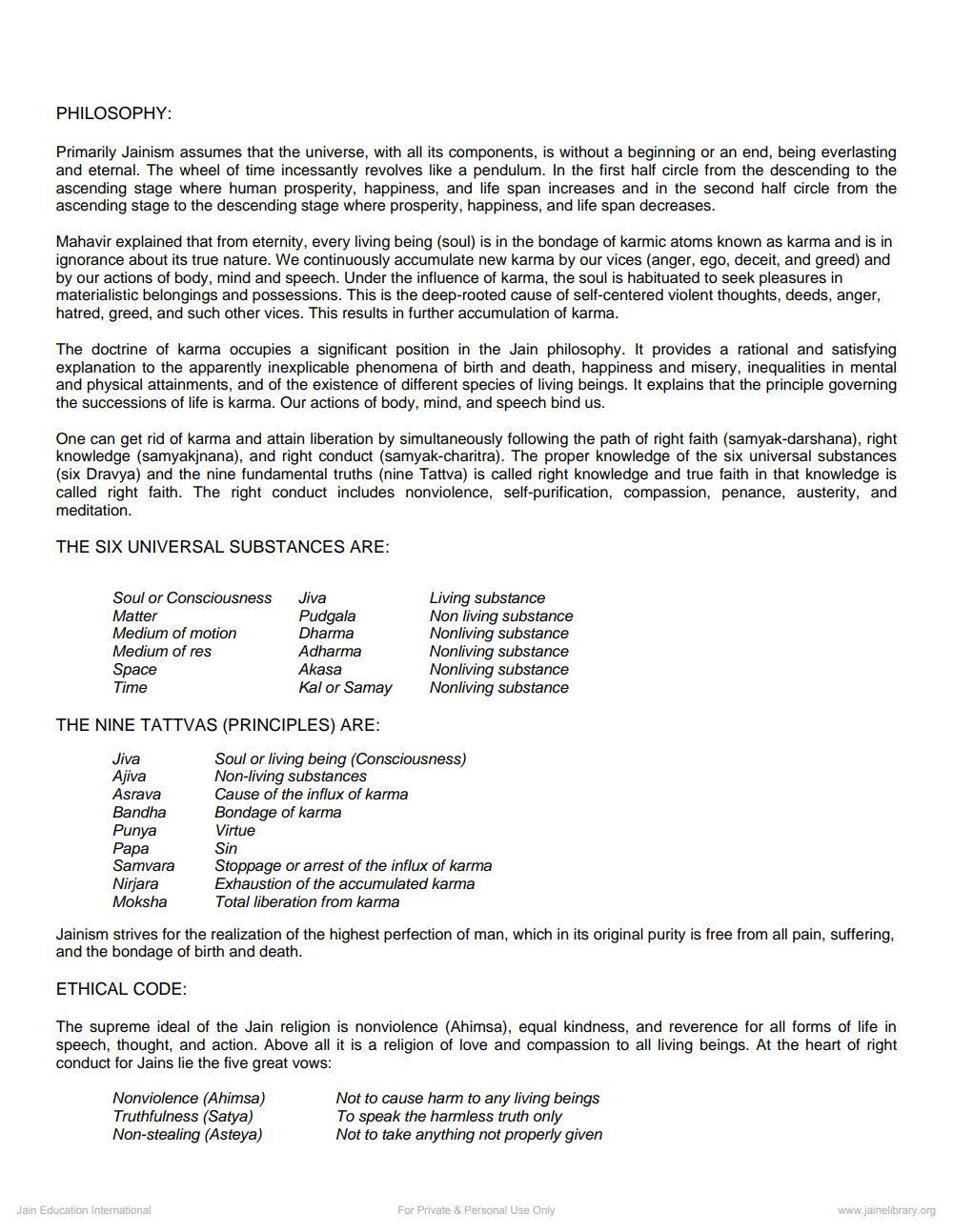Book Title: Jainism Author(s): Pravin K Shah Publisher: JAINA Education Committee View full book textPage 2
________________ PHILOSOPHY: Primarily Jainism assumes that the universe, with all its components, is without a beginning or an end, being everlasting and eternal. The wheel of time incessantly revolves like a pendulum. In the first half circle from the descending to the ascending stage where human prosperity, happiness, and life span increases and in the second half circle from the ascending stage to the descending stage where prosperity, happiness, and life span decreases. Mahavir explained that from eternity, every living being (soul) is in the bondage of karmic atoms known as karma and is in ignorance about its true nature. We continuously accumulate new karma by our vices (anger, ego, deceit, and greed) and by our actions of body, mind and speech. Under the influence of karma, the soul is habituated to seek pleasures in materialistic belongings and possessions. This is the deep-rooted cause of self-centered violent thoughts, deeds, anger, hatred, greed, and such other vices. This results in further accumulation of karma. The doctrine of karma occupies a significant position in the Jain philosophy. It provides a rational and satisfying explanation to the apparently inexplicable phenomena of birth and death, happiness and misery, inequalities in mental and physical attainments, and of the existence of different species of living beings. It explains that the principle governing the successions of life is karma. Our actions of body, mind, and speech bind us. One can get rid of karma and attain liberation by simultaneously following the path of right faith (samyak-darshana), right knowledge (samyakjnana), and right conduct (samyak-charitra). The proper knowledge of the six universal substances (six Dravya) and the nine fundamental truths (nine Tattva) is called right knowledge and true faith in that knowledge is called right faith. The right conduct includes nonviolence, self-purification, compassion, penance, austerity, and meditation. THE SIX UNIVERSAL SUBSTANCES ARE: Soul or Consciousness Matter Medium of motion Medium of res Space Time Jiva Pudgala Dharma Adharma Akasa Kal or Samay Living substance Non living substance Nonliving substance Nonliving substance Nonliving substance Nonliving substance THE NINE TATTVAS (PRINCIPLES) ARE: Jiva Ajiva Asrava Bandha Punya Papa Samvara Nirjara Moksha Soul or living being (Consciousness) Non-living substances Cause of the influx of karma Bondage of karma Virtue Sin Stoppage or arrest of the influx of karma Exhaustion of the accumulated karma Total liberation from karma Jainism strives for the realization of the highest perfection of man, which in its original purity is free from all pain, suffering, and the bondage of birth and death. ETHICAL CODE: The supreme ideal of the Jain religion is nonviolence (Ahimsa), equal kindness, and reverence for all forms of life in speech, thought, and action. Above all it is a religion of love and compassion to all living beings. At the heart of right conduct for Jains lie the five great vows: Nonviolence (Ahimsa) Truthfulness (Satya) Non-stealing (Asteya) Not to cause harm to any living beings To speak the harmless truth only Not to take anything not properly given Jain Education International For Private & Personal Use Only www.jainelibrary.orgPage Navigation
1 2 3 4
